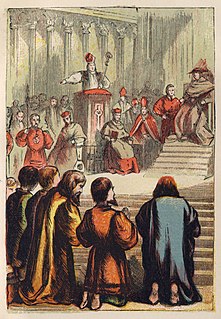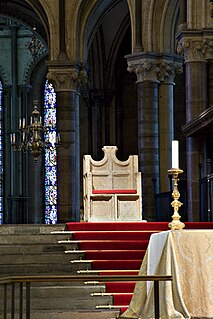Related Research Articles

Lollardy, also known as Lollardism or the Lollard movement, was a proto-Protestant Christian religious movement that existed from the mid-14th century until the 16th-century English Reformation. It was initially led by John Wycliffe, a Roman Catholic theologian who was dismissed from the University of Oxford in 1381 for criticism of the Roman Catholic Church. The Lollards' demands were primarily for reform of Western Christianity. They formulated their beliefs in the Twelve Conclusions of the Lollards.

Robert Barnes was an English reformer and martyr.

The Church of England traces its history back to 597. That year, a group of missionaries sent by the pope and led by Augustine of Canterbury began the Christianisation of the Anglo-Saxons. Augustine became the first Archbishop of Canterbury. Throughout the Middle Ages, the English Church was a part of the Catholic Church led by the pope in Rome. Over the years, the church won many legal privileges and amassed vast wealth and property. This was often a point of contention between Kings of England and the church.

Richard Sibbes (1577–1635) was an Anglican theologian. He is known as a Biblical exegete, and as a representative, with William Perkins and John Preston, of what has been called "main-line" Puritanism because he ever remained in the Church of England and worshiped according to the Book of Common Prayer.
Protestantism originated from the Protestant Reformation of the 16th century. The term Protestant comes from the Protestation at Speyer in 1529, where the nobility protested against enforcement of the Edict of Worms which subjected advocates of Lutheranism to forfeit of all their property. However, the theological underpinnings go back much further, as Protestant theologians of the time cited both Church Fathers and the Apostles to justify their choices and formulations. The earliest origin of Protestantism is controversial; with some Protestants today claiming origin back to people in the early church deemed heretical such as Jovinian and Vigilantius.

The White Horse Tavern or White Horse Inn was allegedly the meeting place in Cambridge for English Protestant reformers to discuss Lutheran ideas, from 1521 onwards. According to the historian Geoffrey Elton the group of university dons who met there were nicknamed "Little Germany" in reference to their discussions of Luther. Whilst the pub undoubtedly existed, several scholars have questioned the existence of the White Horse meetings – they are described by John Foxe in his Book of Martyrs, but no other evidence for them exists. Gergely M Juhász writes that "Foxe’s romantic image of these students and scholars convening secretly on a regular basis in the White Horse Inn… is unsubstantiated", and Alec Ryrie refers to it as "the stubborn legend of the White Horse Inn".
John Dury was a Scottish Calvinist minister and an intellectual of the English Civil War period. He made efforts to re-unite the Calvinist and Lutheran wings of Protestantism, hoping to succeed when he moved to Kassel in 1661, but he did not accomplish this. He was also a preacher, pamphleteer, and writer.
Protestantism is the most popular religion practised in the United Kingdom with Anglicanism, the Reformed tradition, Methodism, Pentecostalism and Baptists being the most prominent branches.
Thomas Sampson was an English Puritan theologian. A Marian exile, he was one of the Geneva Bible translators. On his return to England, he had trouble with conformity to the Anglican practices. With Laurence Humphrey, he played a leading part in the vestments controversy, a division along religious party lines in the early years of the reign of Elizabeth I of England.

The English Reformation took place in 16th-century England when the Church of England broke away from the authority of the pope and the Roman Catholic Church. These events were part of the wider European Protestant Reformation, a religious and political movement that affected the practice of Christianity in western and central Europe.
Richard Nykke was bishop of Norwich, the last Roman Catholic to hold the post before the Henrician reform. Described as "ultra-conservative", but also "much-respected", he maintained an independent line and was embroiled in conflict until blind and in his last years. He is often called the last Catholic bishop of the diocese, but that title is also claimed by John Hopton, bishop under Mary I of England. Norwich at this time was the second-largest conurbation in England, after London.
Anthony Gilby (c.1510–1585) was an English clergyman, known as a radical Puritan and translator of the Geneva Bible, the first English Bible available to the general public. He was born in Lincolnshire, and was educated at Christ's College, Cambridge, graduating in 1535.

Protestantism is a form of Christianity that originated with the 16th-century Reformation, a movement against what its followers perceived to be errors in the Catholic Church. Protestants originating in the Reformation reject the Roman Catholic doctrine of papal supremacy, but disagree among themselves regarding the number of sacraments, the real presence of Christ in the Eucharist, and matters of ecclesiastical polity and apostolic succession. They emphasize the priesthood of all believers; justification by faith alone rather than by faith with good works; the teaching that salvation comes by divine grace or "unmerited favor" only, not as something merited ; and either affirm the Bible as being the sole highest authority or primary authority for Christian doctrine, rather than being on parity with sacred tradition. The five solae of Lutheran and Reformed Christianity summarise basic theological differences in opposition to the Catholic Church.

The reign of Elizabeth I of England, from 1558 to 1603, saw the start of the Puritan movement in England, its clash with the authorities of the Church of England, and its temporarily effective suppression as a political movement in the 1590s by judicial means. This of course led to the further alienation of Anglicans and Puritans from one another in the 17th century during the reign of King James (1603-1625) and the reign of King Charles I (1625-1649), that eventually brought about the English Civil War (1642-1651), the brief rule of the Puritan Lord Protector of England Oliver Cromwell (1653-1658), the English Commonwealth (1649-1660), and as a result the political, religious, and civil liberty that is celebrated today in all English speaking countries.

Historians have produced and worked with a number of definitions of Puritanism, in an unresolved debate on the nature of the Puritan movement of the 16th and 17th century. There are some historians who are prepared to reject the term for historical use. John Spurr argues that changes in the terms of membership of the Church of England, in 1604–6, 1626, 1662, and also 1689, led to re-definitions of the word "Puritan". Basil Hall, citing Richard Baxter. considers that "Puritan" dropped out of contemporary usage in 1642, with the outbreak of the First English Civil War, being replaced by more accurate religious terminology. Current literature on Puritanism supports two general points: Puritans were identifiable in terms of their general culture, by contemporaries, which changed over time; and they were not identified by theological views alone.

St Edward's Passage, known in the 18th century as Chain Lane, is a Y-shaped alleyway in Cambridge, England, between King's Parade—opposite the main gate of King's College—and Peas Hill. It houses the entrance and churchyard of the Church of St Edward King and Martyr; the Cambridge Arts Theatre; several cottages; G. David, an independent bookshop run from the same building since 1896; a few businesses; and student accommodation. It is a narrow, dark lane, with riven-stone paving, which opens out onto the much wider and sunnier King's Parade.
The Parker Society was a text publication society set up in 1841 to produce editions of the works of the early Protestant writers of the English Reformation. It was supported by both the High Church and evangelical wings of the Church of England, and was established in reaction against the Tractarian movement of the 1830s. Its Council was dominated by evangelicals, but not to the exclusion of other views.

Edward Newenham Hoare, a graduate of Trinity College, Dublin was an Irish Anglican priest: he was Archdeacon of Ardfert from 1836 to 1839, then Dean of Achonry from 1839 to 1850; and Dean of Waterford from then until his death.
Peter Marshall is a Scottish historian and academic, known for his work on the Reformation and its impact on the British Isles and Europe. He is Professor of History at the University of Warwick.
Alexander Gray Ryrie, is a British historian of Protestant Christianity, specializing in the history of England and Scotland in the sixteenth and seventeenth centuries. He was appointed Professor of Divinity at Gresham College in 2018. He was elected a Fellow of the British Academy in 2019.
References
- ↑ p.64, Women, Reform and Community in Early Modern England:Katherine Willoughby, Duchess of Suffolk, by Melissa Franklin Harkrider
- ↑ Ryrie, Alec (9 October 2003). The Gospel and Henry VIII: Evangelicals in the Early English Reformation. Cambridge University Press. p. 75. ISBN 9781139440554 . Retrieved 30 March 2018.
- ↑ Griffiths, Jane (23 February 2006). John Skelton and Poetic Authority: Defining the Liberty to Speak. Clarendon Press. p. 165. ISBN 9780199273607 . Retrieved 30 March 2018.
- 1 2 Strype, John (1816). Ecclesiastical memorials: relating chiefly to religion, and its reformation under the reigns of King Henry VIII, King Edward VI, and Queen Mary the First; with the appendixes containing the original papers, records, etc. S. Bagster. p. 593. Retrieved 30 March 2018.
- ↑ Skelton, John (1856). The Poetical Works of John Skelton. Little, Brown and Company. p. cxxiii. Retrieved 30 March 2018.
- ↑ Marshall, Peter; Ryrie, Alec (30 May 2002). The Beginnings of English Protestantism. Cambridge University Press. p. 90. ISBN 9780521003247 . Retrieved 30 March 2018.
- ↑ Hyde, Jenni (15 February 2018). Singing the News: Ballads in Mid-Tudor England. Taylor & Francis. p. 219. ISBN 9781351372992 . Retrieved 30 March 2018.
- ↑ Ryrie, Alec (9 October 2003). The Gospel and Henry VIII: Evangelicals in the Early English Reformation. Cambridge University Press. p. 102. ISBN 9781139440554 . Retrieved 30 March 2018.
- ↑ Usher, Brett (2 March 2017). William Cecil and Episcopacy, 1559–1577. Taylor & Francis. p. 24. ISBN 9781351872898 . Retrieved 30 March 2018.
- ↑ Taylor, Stephen (1999). From Cranmer to Davidson: A Church of England Miscellany. Boydell & Brewer. p. 59 note 49. ISBN 9780851157429 . Retrieved 30 March 2018.